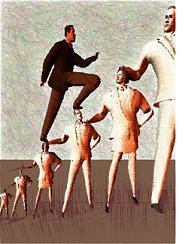The Narcissistic Paradox
 By Giles Burch, University of Auckland, New Zealand
By Giles Burch, University of Auckland, New ZealandAs occupational psychologists we have an interest in identifying the personality traits most associated with success in the workplace, in particular those associated with effective leadership. For example, Nicholson (1998) identified how entrepreneurial leaders are higher in conscientiousness compared with mid-level managers. However, more recently there has been a growing interest in those traits or 'dysfunctional dispositions' that may ultimately result in the leader's derailment (e.g. Hogan & Hogan, 2001). One such disposition is that of narcissism. In this context we consider narcissistic personality at the sub-clinical level, where narcissism is defined as having an inflated sense of self-importance, grandiosity and entitlement, with weaknesses such as sensitivity to criticism, poor listening skills, a lack of empathy, a dislike for mentoring, and an intense desire to compete (Maccoby, 2000)
The notion of the 'narcissistic manager' is not new and recent publications in the management literature have served to raise the prominence of this concept. However, what becomes apparent from this literature is the 'paradox' of the narcissistic personality in relation to leadership success, whereby narcissism appears to facilitate the rise up into more senior managerial positions, yet as narcissists take on more of a leadership role, these dispositions may become increasingly associated with subsequent derailment. It is likely that this paradox is not limited to narcissistic personality, but rather a number of dysfunctional dispositions. Indeed, Paulhus & Williams (2002) highlight the overlapping relationships between the socially aversive personalities of narcissism, Machiavellianism (manipulative personality) and (sub-clinical) psychopathy. However, narcissism in particular appears to be typical in respect to this paradox, with arrogance and an over-inflated sense of self-importance appearing to be important determinants in the rise of the narcissist. Whilst Hogan and Hogan (2001) suggest that many people rise in the organisation due to their political savvy and luck, others suggest that it is the narcissist's ambition and charisma that facilitates their rise (see Lubit, 2002; Maccoby, 2000). This therefore raises the question as to the point at which these narcissistic traits may become more of a negative disposition. It seems most likely that the narcissist's asocial personality will become problematic once they take on more of a leadership role, when, as the literature on emotional intelligence suggests, effective leadership is characterised (at least partially) by self-awareness and empathy (for example, see Goleman, Boyatzis & McKee, 2002).
So where does this leave us in practical terms? Maccoby (2000) suggests that getting the narcissist into analysis can help, but highlights that their need for control makes them unlikely to engage in any kind of insight therapy. In my own experience of working with socially aversive personalities, it (not surprisingly) proves increasingly difficult to get the individual to recognise the need for change, particularly if at this stage they have become successful, with a lifestyle characterised by an indiscrete display of power and wealth - which only serves to reinforce the narcissist's sense of self-importance. Even when gross errors are made, e.g. poorly brokered deals, which may turn out to cost the organisation dearly, it is difficult to bring the narcissist back to a sense of reality. Alternatively, Lubit (2002) suggests that it is more an issue of 'managing' one's relationship with the narcissist, rather than trying to address issues directly with them, thereby highlighting the possible futility of any direct intervention with the narcissist.
So, what can you do as a consultant, coach or diagnostician? Given that the narcissist's arrogance is coupled with a contempt for people around them, except for those who can facilitate their rise further, one approach is to try to address these asocial traits earlier on in the manager's career through coaching, when the narcissist is perhaps more likely to take note of the coach, who paradoxically, they may perceive as being able to help facilitate their desired rise to the top! At this point, at least, there is an opportunity to condition them to recognise strategies that support their achievements and behaviours that are likely to impede their sustained success.
From my own experience and the wealth of literature that is now growing in this and related areas, organisations are all too painfully aware of the darker side of leadership (think of the boardroom and CEO embarrassments that were publicised in 2004 alone) and its cost to them. The value of what we can offer is easily recognised when organisations consider the shareholder or political impact of a flawed leader or senior executive.

<< Home